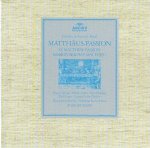The evolving musical climate of the 1950s occasioned a profound shift of culture and attitude in the performance of Bach’s great choral works. By the close of the decade, it was one of Bach’s own successors in the post of Kantor at Leipzig’s Thomaskirche, Karl Richter (who’d become organist there at age 23 in 1947), who’d become torch-bearer for a new generation of Bach interpreters. Richter’s recordings with the Munich Bach Choir and Orchestra (ensembles he founded in 1951 and with which his name has become synonymous) heeded an unbroken Leipzig tradition that could be traced back to the time of Bach himself.
But in two key areas there were important breaks with many of that tradition’s seemingly indissoluble conventions: first, Richter rejected a mode of performing the Passions using choral and orchestral forces more akin to Mahler or Bruckner than Bach; second, thanks to slimmer performing resources, tempos suddenly became quicker, and critics were universally astounded by the revelations afforded by Richter’s leaner, sparer, more urgent approach. Renate Freyse’s famous analysis compared Richter’s account with Klemperer’s more or less contemporaneous EMI/Philharmonia version, concluding that the latter’s “basically calm approach to tempo means that his recording of the St. Matthew Passion lasts around 40 minutes longer than Richter’s.”
Richter’s set was taped at 22 sessions held between June and August, 1958. Now it occupies three elegantly digitalized CDs rather than eight LP sides, and this landmark account still rates as one of the finest versions ever committed to disc. Comparisons between Richter and Klemperer are fascinating, and points of divergence between their readings are too numerous to attempt to enumerate adequately here. In essence, you could say that Klemperer’s version (recently reissued in EMI’s Great Recordings of the 20th Century series) is firmly rooted in 19th century Kapelmeister-ish conventions, these being reflected as much by the very measured and stately tempos as by the respectful avoidance of rhetoric. Richter brings the score alive (perhaps for the first time) as a gripping, unfolding human drama, giving recitatives a biting realism by faster vocal articulation, and imparting to the great chorales a frank objectivity of expression that Klemperer’s generation would have considered dangerous, even disrespectful. Richter’s continuo team is superb, and it’s given more expressive freedom than Klemperer’s, as are his vocal soloists, especially tenor Ernst Haefliger as the Evangelist and Kieth Engen as Jesus.
Of course, nearly half a century later, period practice and so-called “authenticity” (as with Herreweghe’s or Gardiner’s recent accounts) tried to make things even more “correct”, whatever that might mean. But it’s Karl Richter’s depth of understanding of this work that did much to encourage a widespread reappraisal of how the St. Matthew Passion should be performed, and nothing that’s been achieved since was attained without reference to his defining example. So this is a supreme realization, eloquently reasoned and wonderfully played and sung; a landmark recording that no collection can afford to be without.
































